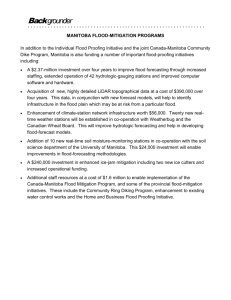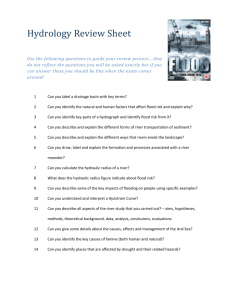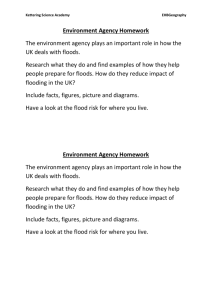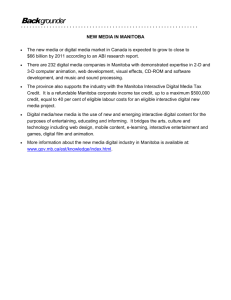PPWB Prairie Hydrology Workshop
advertisement
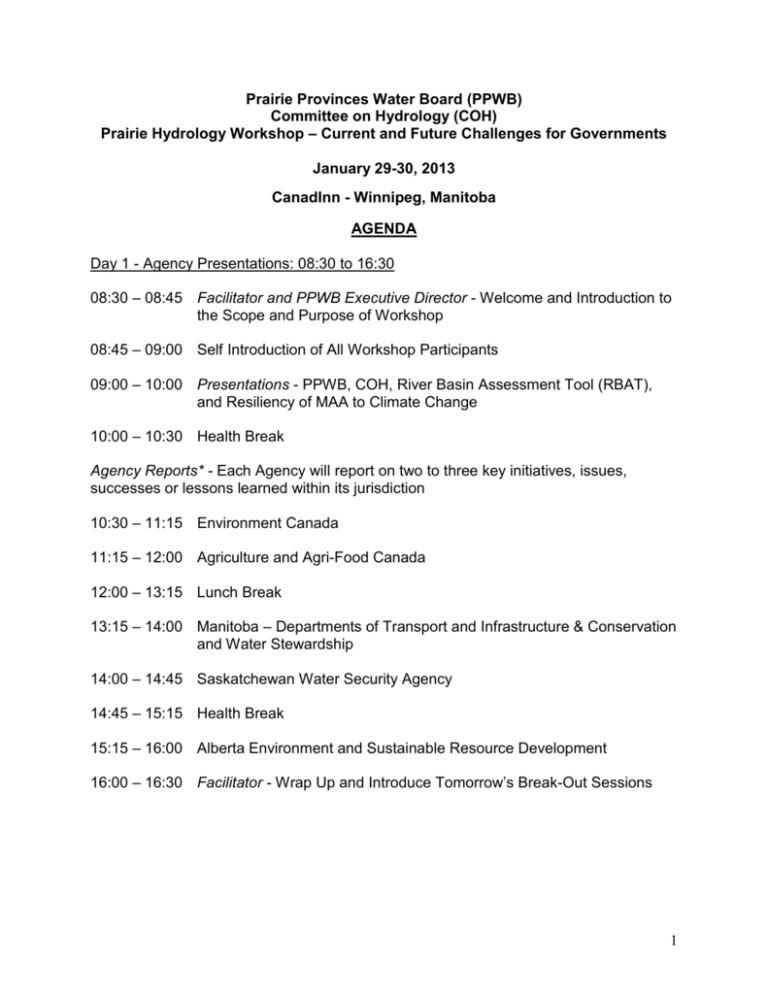
Prairie Provinces Water Board (PPWB) Committee on Hydrology (COH) Prairie Hydrology Workshop – Current and Future Challenges for Governments January 29-30, 2013 CanadInn - Winnipeg, Manitoba AGENDA Day 1 - Agency Presentations: 08:30 to 16:30 08:30 – 08:45 Facilitator and PPWB Executive Director - Welcome and Introduction to the Scope and Purpose of Workshop 08:45 – 09:00 Self Introduction of All Workshop Participants 09:00 – 10:00 Presentations - PPWB, COH, River Basin Assessment Tool (RBAT), and Resiliency of MAA to Climate Change 10:00 – 10:30 Health Break Agency Reports* - Each Agency will report on two to three key initiatives, issues, successes or lessons learned within its jurisdiction 10:30 – 11:15 Environment Canada 11:15 – 12:00 Agriculture and Agri-Food Canada 12:00 – 13:15 Lunch Break 13:15 – 14:00 Manitoba – Departments of Transport and Infrastructure & Conservation and Water Stewardship 14:00 – 14:45 Saskatchewan Water Security Agency 14:45 – 15:15 Health Break 15:15 – 16:00 Alberta Environment and Sustainable Resource Development 16:00 – 16:30 Facilitator - Wrap Up and Introduce Tomorrow’s Break-Out Sessions 1 Topics have been identified by Agency Representatives on Working Group: Environment Canada (Brian Wiens and Colin Angus) The push for real-time hydrometric data and operational challenges in large floods Hydrology projects by the Hydrometeorological and Arctic Lab (HAL) and others Climate projects underway in the Prairies and climate data Agriculture and Agri-Food Canada (R. Woodvine) Gross and Effective Drainage Area Delineation National Annual Unit Runoff Study Gross Evaporation Calculations and Database Manitoba Transportation and Infrastructure & Conservation and Water Stewardship Manitoba Drought Management Strategy (Kashem Abul) Lake Flood Protection Level Determination in Manitoba (Bin Luo) Flood Forecasting in Manitoba (Phillip Mutulu) The Manitoba 2011 Floods (Mark Lee) Saskatchewan Water Security Agency (B. Oegema) 2011 Flood Experience on the South Saskatchewan and Qu’Appelle Systems Proposed Development of Lake Diefenbaker Reservoir Operation Manual Alberta Environment and Sustainable Resource Development (T. Chamulak) Challenge: Minimum Environmental Stream Flows and the Desktop Method Success: Hydrology GIS applications; ArcHydro, AWAIT tools and techniques used to conduct spatial queries for licensed projects, delineate catchment areas, query time-series data 2 Day 2 – Break-Out Sessions: 08:30 to 15:00 08:30 – 08:50 Facilitator – Highlights from Day 1 and Break-Out Session Introduction 08:50 – 09:30 Break Out Session ”A” – Gross and Effective Drainage Areas What tools / methods can be used in the future to delineate gross and effective drainage areas across the Prairies? Who will be responsible to develop and maintain the drainage area delineation database used by the PPWB and its member agencies? 09:30 – 09:50 Break Out Session “A” Report Back to Plenary 09:50 - 10:20 Health Break 10:20 – 11:00 Break Out Session “B” – Gross Evaporation What tools / methods can be used in the future to estimate gross evaporation across the Prairies? Who will be responsible to compute and maintain the gross evaporation database that is used by the PPWB and its member agencies? 11:00 - 11:20 Break-Out Session “B” Report Back to Plenary 11:20 – 12:00 Break-Out Session “C” – Flood Management What flood magnitude criteria are best used to manage floods across jurisdictions – flood of record, return period flood, other? How can Agencies collaborate to better forecast and manage floods across borders or to better manage floods in general? What are the Lessons Learned from the recent extreme flooding, and how can these be used to improve flood management in general or across jurisdictions? 12:00 – 13:10 Lunch Break 13:10 – 13:30 Break Out Session “C” Report Back to Plenary 13:30 – 14:30 Presentation (TBD) – Smith Creek Monitoring and Prairie Hydrology Model Enhancement Panel Discussion – Hydrologic Modelling in a Prairie environment 14:30 – 15:00 Workshop Wrap-up, Highlights, Comments 3

